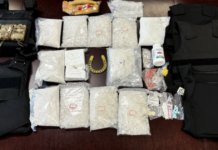The RCMP will consider revising its policy on how long an officer can use recreational cannabis before they return to work from 28 days prior to duty to 24 hours.
The current policy, which has been in place for the last five years when Canada first legalized recreational cannabis, requires Mounties to abstain from consuming pot for four weeks prior to duty.
The Canadian Press obtained an internal RCMP briefing note via the Access to Information Act which said that it was recommending a 24-hour restriction period for Mounties prior to reporting for duty, with certain exceptions.
The policy change could be used as a catalyst for recruiting new officers, by making the policy for Mounties similar to that of other police forces that have a less restrictive approach to cannabis use.
The current policy is under review however the final decision has yet to be made, according to RCMP spokesperson Robin Percival.
The current four-week policy is in effect not just for officers but also reservists, telecommunication operators and firearm technicians.
The 2018 policy on substance use reasoned that the prohibition of use for members such as first responders in rural and remote communities was partly because they can be called back into work on very short notice.
“All RCMP employees must be fit for duty when reporting for work, which includes not being impaired by alcohol or drugs,” reads a notice on the RCMP website.
“Science shows that cannabis can intoxicate beyond initial consumption and that there are no established safe limits or data on how it affects performance. Without established scientific information about cannabis impairment, the RCMP policy is taking a careful approach at this time, to ensure workplace and public safety is maintained at all times.”
One recreational cannabis user, named Talyor, 32, told the Canadian Press he is eager to join the RCMP but would like to see the policy changed. He did not want his full name published for fear that it might hinder his chances of becoming a Mountie.
In an interview with the Canadian Press, Taylor said he enjoyed recreational cannabis use weekly as a means to relieve stress and alleviate certain physical pain.
“In my family, we were always raised to respect authority and police and that they’re your friend, and they’re there to help,” said Taylor.
“And from all the situations where I’ve had contact with them, they’ve been great to me, and that’s the uniform I’d like to wear and kind of give back to my community. They have strong Canadian traditions, but they’re just so behind in their policy. I think as the times change so must the policies.”
The news of a potential policy revision sparked a newfound interest in joining the force.
“I can honestly say if they made this announcement tomorrow, that they’re changing their policy, I’d apply tomorrow,” said Taylor.
RCMP Commissioner Micheak Duheme said that the risk of impairment from cannabis varies depending on the person, how often they use it and the quality of the product they use, according to a briefing note from earlier this year.
The note said that RCMP statistics regarding Code of Conduct allegations over the last five years found known impairment occurrences were below 0.15% within the 18,000 regular force members.
“Policing organizations that initially had a zero tolerance or 28-day restriction have or are moving towards either a fit for duty or 24-hour abstinence requirement, or a combination of both.” said the note.
The note also mentioned the fact that the National Police Federation, an organization that represents rank-and-file Mounties said that among their most common inquiries during recruiting sessions “pertained to our policy on the recreational use of cannabis.”
The potential move to a 24-hour restriction period prior to duty would apply to all RCMP safety-sensitive positions, however specialized occupational groups would be excluded from the proposed policy change.
Those groups include air marshals and pilots, emergency response team members, and security detail for the prime minister and the governor general.





















